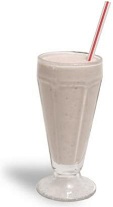|
Definition: "An ergogenic aid is any substance or phenomenon that enhances performance "
|
|
||||||||
20.12.2013 |
|
|
Post-workout shake with 22g whey works better than one with 22g soya protein
Strength athletes who consume slightly more protein than the recommended amount for non-athletes build up more lean body mass if they drink a post-workout shake containing whey rather than one containing soya protein. The renowned sports scientists Jeff Volek and William Kraemer draw this conclusion in a human study published in the Journal of the American College of Nutrition. The study is the longest that has ever been carried out on the effect of post-workout protein supplementation.
So the researchers did an experiment in which they got 63 men and women aged 18 to 35 to do weight training for nine months, and gave them a shake after every workout. All test subjects followed the same training schedule, training 2-3 times a week and consuming 1-1.2 g protein per kg bodyweight per day in their diet.
The researchers gave one group of subjects a shake that contained only the fast carbohydrate maltodextrin. Another group were given a shake containing 22 g soya-protein concentrate without isoflavones. A third group were given a shake containing 22 g whey concentrate. The shake meant that the daily protein intake of the whey and soya protein groups rose to 1.4 g protein per kg bodyweight.
On the days that the subjects did not train, they drank their shake at breakfast.
At the end of the nine months, the researchers could not detect any statistically significant differences in the strength progression between the three groups. Nor were there any significant differences between the groups when it came to the decrease in fat mass. There was however a significantly different effect on the lean body mass.
The whey-shake drinkers built up 3.3 kg lean body mass. The soya protein and maltodextrin users got no further than 1.8 and 2.3 kg respectively.
The factor that makes whey such an effective post-workout product is probably the amino acid leucine, which is present in large quantities in whey and not in soya protein.
The researchers discovered that the subjects built up more lean body mass, the higher the level of leucine in their blood in the early morning before breakfast. As you'd expect, the whey users had more leucine in their blood than the subjects in the two other groups.
"Daily supplementation with approximately 20 g whey protein during resistance training is an effective strategy for augmenting gains in lean body mass in young, healthy, untrained men and women consuming protein levels slightly above the recommended dietary allowance", the researchers write. "Gains in lean body mass occurred in the context of stable or small decreases in fat mass. These results point to protein quality as an important determinant of the adaptive response to whole-body resistance training."
Source:
More:
|
|



